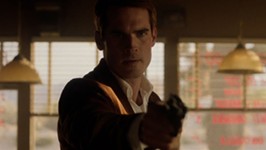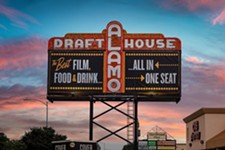Fantastic Fest Interview: A Fresh Point of View With the Iké Boys
Eric McEver talks anime, obsession, and making friends with cats
By Richard Whittaker, 10:00AM, Sat. Sep. 25, 2021
Everyone has a different way to get through the pandemic. For Oklahoma filmmaker Eric McEver, writer/director of Fantastic Fest action-comedy Iké Boys, it's cats.
He recalled, "I wasn't able to interact with many people, for obvious reasons, so to clear my head I would take long walks in the neighborhood, and I ended up befriending the neighborhoods cats. Cats - talk about seeing things from a different perspective."
Those fuzzy interactions helped with an additional layer of isolation that McEver felt. Ever since college, he's been a regular visitor to Japan: he explained, "not just on a practical level but on a personal level it really has been my second home." While the pandemic has been an opportunity to reconnect with America, "it's like half my life has gone asleep for a while. ... It's not just about the big grand things you recognize about a place, it's about the smell of the air, and the day-to-day rhythms. It's a decade's worth of friends, and people that I would meet with on a weekly basis just to talk about life."
This question of appreciating different perspectives is at the heart of Iké Boys, a heartfelt ode to growing up loving a culture from the outside, as well as an old-fashioned kid-friendly action flick with rubber suit monsters. Shawn Gunderson (Quinn Lord) and his best friend, Vikram 'Vik' Kapoor (Ronak Gandhi), and a newcomer to their Oklahoma high school, Japanse exchange student Miki Shimizu (Christina Higa). Shawn couldn't be happier: he's an otaku (or, in more dismissive terms, a weeb), obsessed with Japanese culture, and now not only does he have a new friend to talk to, but he's also come across a lost anime. What he doesn't know is that Miki has her own cultural obsessions. Oh, and the anime may be the only way to stave off the upcoming apocalypse.
All those themes of finding common ground and appreciating uniqueness crystalized in what McEver called "a moment of radical empathy," one evening with one of those friendly local felines. "I was watching the sunset, and watching the cat watching the sunset, and it occurred to me that my view of this sunset, my view of this world, is not superior to that of this cat. We're seeing the world in different ways, and she's picking up on things that I'm not, and I'm picking up on things that she's not. ... None of us has a monopoly on the truth, and that's how we make life happen. We overlap, and we try to appreciate the fact that the other sees things that we don't."
Austin Chronicle: So what was your entry point anime?
Eric McEver: There's two ways to answer the question.
The cute little facetious version of my life story, which is also 100% true, was that I was a little boy who loved dinosaurs, and loving dinosaurs led to watching Godzilla films, and that clicked a place in my head that, oh, I'm going to make a Godzilla film one day and do what it takes to make that happen. This was around age seven, and I just haven't changed since then.
Going to anime specifically, Godzilla led to a broader interest in Japan, which led to anime. I got old VHS tapes of Voltron - a lot of kids, children of the eighties and nineties did - and it planted this seed that this is not something that came from the same part of the world. I remember a specific moment watching a Godzilla film, around seven or eight, and I remember thinking, "Oh, the words they're saying don't match up with what's on their lips, and the landscape out there is not my landscape in Oklahoma. This is not an American film." It's an obvious thing, but it was this really profound realization that there are very, very different lived realities in other parts of the world. And it planted a question in my mind that I've been searching for the answer to ever since.
But if you wanted the answer in one word, it would be "dinosaurs."
EM: We're all just about as insecure as every other person, we just have different ways of dealing with it. Some people put up bigger, more obvious, hostile fronts, and those are generally the most insecure people of all. So my thinking here, and the real underlying goal, was I wanted to make one of those films that people have had a really awful day, and you pick it up and come home and go, "Yeah, I wanna watch Ike Boys!" And I figured that if I wanted to make a movie that an audience member would turn to when they're emotionally vulnerable, I need to make myself emotionally vulnerable to them. So I just tried to lean into the authenticity of a childhood caring about things that no one else around me seemed to care about. And if I'm as honest as possible about my own lived experience, I can in some way touch into something universal with the viewer.
AC: There are a lot of Japanese people who have an obsession with a particular part of American culture, and the film also has this theme of getting but not getting a culture.
EM: Shawn and Vik are very loosely inspired by high school-age me and my best friend. There was no Japanese exchange student that came to my high school, but I have several different very dear Japanese female friends in Japan who clearly lived a Miki-esque experience.
One of the interesting things about Japan is that it's such a homogenous culture, and there's so much pressure to fit in, there's a side effect that when people develop a passion they will go full hog in a very specific niche. I have a very dear friend whose passion is going around the world and photographing ghost towns. She's released a photobook of Chernobyl, and that is her deal. She actually came to Oklahoma to visit land run-era ghost towns and hung out with me then.
It comes from a very real place, and the things that she picks up on are all real, but they are from one perspective. That's what a lot of us do: we see one perspective on things, and we kind of fall down on that. Of course we're going to get some things wrong, but the important thing is that we're trying. And if we're trying to listen, and we're trying to learn, then the mistakes are OK because it's part of the process.
And what's the expression? Fresh eyes see clearer. I think there's a lot of truth to that. There are things about ourselves that we are unwilling to admit, and other people will pick up on them, and really understand them. For years my Japanese friends would ask me if I was afraid of all the guns in America and, oh, they were on to something. Biases are a real thing, but outside looking in can illuminate things.
Iké Boys
US premiere
Sunday, Sept. 26, 7:30pm at Alamo South Lamar; Monday, Sept. 27, 7:30pm at Alamo Village.
Fantastic Fest 2021, Sept. 23-30. Tickets and info at fantasticfest.com. Follow all our coverage at austinchronicle.com/fantasticfest.
A note to readers: Bold and uncensored, The Austin Chronicle has been Austin’s independent news source for over 40 years, expressing the community’s political and environmental concerns and supporting its active cultural scene. Now more than ever, we need your support to continue supplying Austin with independent, free press. If real news is important to you, please consider making a donation of $5, $10 or whatever you can afford, to help keep our journalism on stands.
May 17, 2024
May 16, 2024
Fantastic Fest, Fantastic Fest 2021, Iké Boys, Eric McEvers









